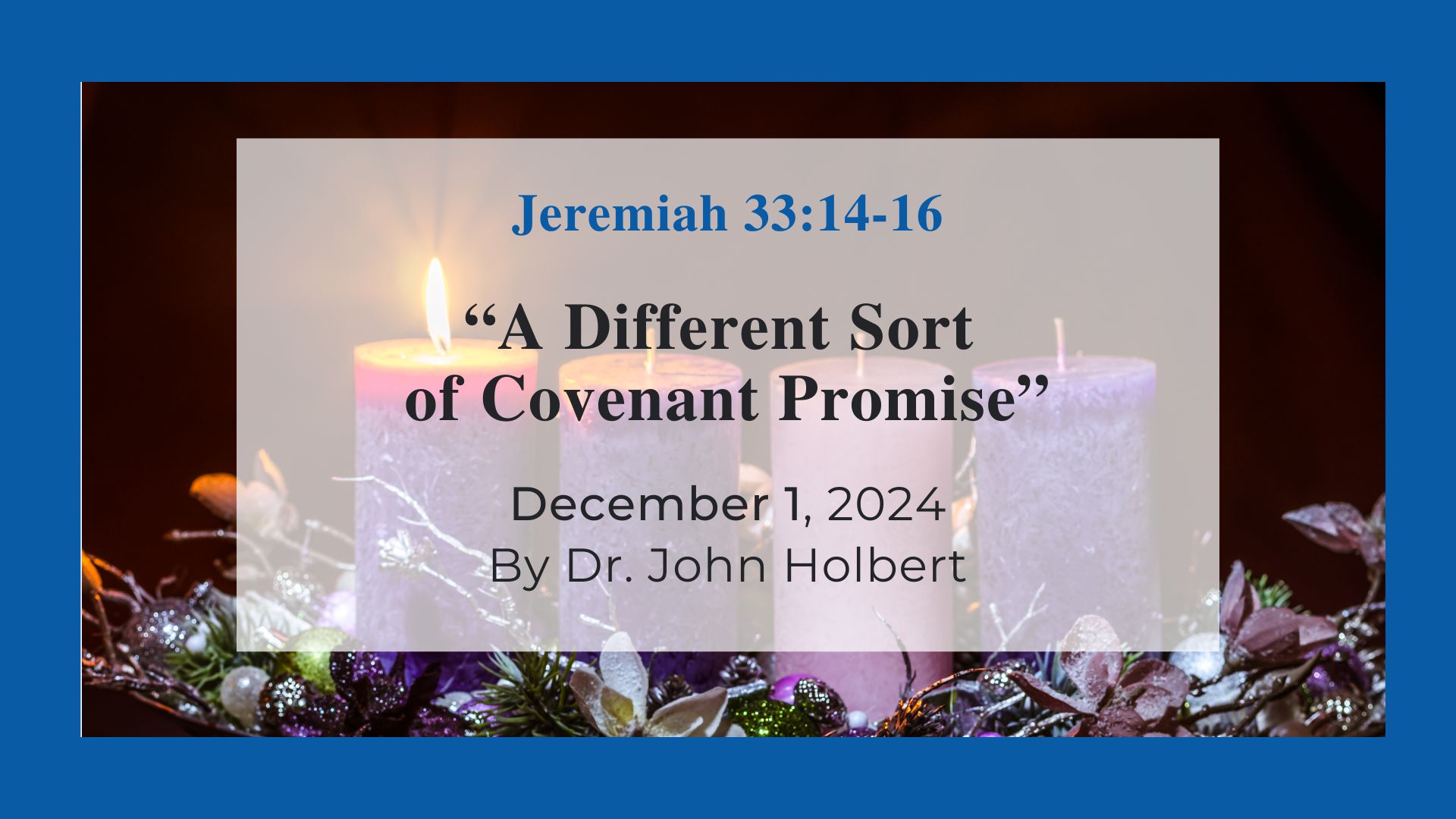A Different Sort of Covenant Promise - Reflections on Jeremiah 33:14-16 for Advent 1, Year C
by John Holbert on Wednesday, November 27, 2024

The early Christians were forever combing the Hebrew Bible (or more accurately the Greek Old Testament—LXX) for texts or snippets of texts that illuminated for them their emerging understanding of just who the Messiah Jesus was. The prophets were an especially fertile field for such texts, led perhaps by Isaiah whose long three-plus volumes in 66 chapters played an outsize role in the portrait of Jesus that began to crystalize among the early church communities. However, today, in this First Sunday of Advent, 2024, we turn to Jeremiah and his complex collection of oracles, poems, and literary promises that were compiled in and around the collapse of Judah in 587BCE and following. In the book, many oracles from the prophet are included, especially in the early parts of the prophecy, while other disparate writings find their way into the collection, particularly toward the end of the book.
Jeremiah was perhaps called to prophecy, if the first chapter has any historical validity, during the reign of King Josiah of Judah, late in the 7th century BCE, and continued his work for YHWH until the fall of Jerusalem under Zedekiah, “son of Josiah of Judah, until the captivity of Jerusalem in the fifth month,” in his 11th regnal year (Jer.1:3). Thus, Jeremiah was prophet in Judah, that is the only remaining state of what was Israel, for at least 40 years, witnessing the capture of the city by Nebuchadnezzar of Babylon in that fateful year, along with the humiliation of the king and his family by the foreign captors. While the blinded Zedekiah was herded off to a Babylonian exile, Jeremiah, apparently against his will, was taken to Egypt where he is presumed to have died.
It is important to understand this history in order to grasp the fuller import of what Jer.35 is about. Its Israelite concern is: what will now happen when a Davidic king no longer sits on the throne of a now nonexistent Israel? And, equally important is the destruction of the Jerusalem Temple, the theft of the implements of worship, and thus the end of the Levitical priests’ sacrificial worship of YHWH. Jer.35 in anguished tone laments the end of Davidic kingship and Levitical priesthood by promising in full divine voice the return of both. In other words, both may now be absent, but YHWH promises that in the future both will return in triumph.
“Look! The days are coming, says YHWH, when I will raise up the good word that I spoke to the house of Israel and the house of Judah” (Jer.35:14). “Raising up the good word” is apparently a euphemism for “fulfilling a promise.” Again and again, in the face of multiple catastrophes, the chief of which is Judah’s exile to Babylon, YHWH announces that soon—however soon is never stated—all will be made right and whole again for God’s people. Jeremiah then says, “In those days and in that time (note again the completely vague quality of this language) I will cause to sprout for David a righteous sprout (“branch” is the usual translation, but the noun “sprout” is directly related to the verb “cause to sprout”) and it (“he”) shall make justice and righteousness in the land” (Jer.35:15). In short, this “branch,” unnamed and unknown, will do what Davidic kings have been called to do since Ps.72, that rich coronation psalm, namely “judge God’s people with righteousness and God’s poor with justice.” This coming “branch” will do precisely that.
As a result of the branch’s actions, “In those days, Judah will be saved (perhaps “rescued”) and Jerusalem will live in safety. And this is the name by which it will be named: YHWH is our righteousness” (Jer.35:16). Right here, surmised the early Christians, is found the promise of Jesus Messiah, that promised one whose role, they imagined, was to fulfill this vague, though prescient word from Jeremiah to be the bringer of justice and righteousness to the earth. The text goes on to promise that the Levitical priests will return to reconstitute the lost sacrificial practice. The assurance of the writer is so certain that only if the “covenant with day and night,” that is the absloute certainty of dawn and dusk, was somehow broken (Jer.35:19-22), would the Davidic king and the Levitical priest fail to appear. When and how remain unspoken, but that it will happen is unquestionable, as certain as day following night.
Unfortunately, we all still await the fulfillment of this grand promise. For Jews, the current war with Palestine is a tragically different portrait of “justice and righteousness in the land,” and for Christians the deep divide between understandings of what Christianity actually means flies in the face of any promise that “YHWH is our righteousness.” Still, Advent, as always, is a time of waiting and hoping, imagining that this year at last the huge promises of God might find a sort of fulfillment, however fleeting, however difficult. Let us light that first Advent candle of hope and dream together of a world where God is finally somehow “our righteousness.”
